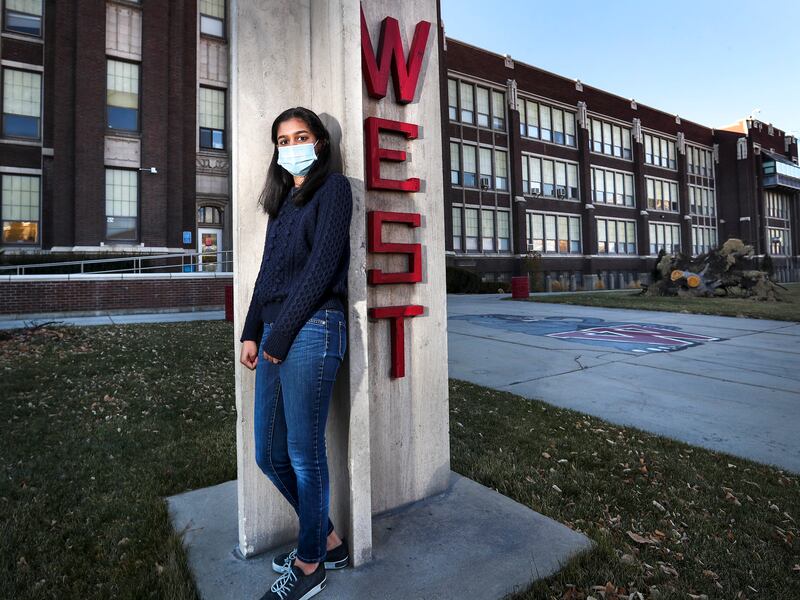SALT LAKE CITY — West High School student Arundhati Oommen asked the Salt Lake City Board of Education Tuesday for its support on an initiative to expand voting rights to youth as young as 16 years to vote in local school board elections.
Oommen, a nonvoting student member of the Salt Lake school board, presented her case to the full board Tuesday, arguing that students are the district’s largest stakeholder group but have little say when it comes to school district governance.
“It is a true paradox that students are only allowed to vote for their school board representatives once they have aged out of the schooling system — having a say in the future education of other students, but not in their own,” she wrote in a board document.
In the recent election, some 37,000 voters in Salt Lake County did not complete their ballots, which means they didn’t vote in local races, those that make the greatest direct impact in people’s lives and where every vote can make a difference, she said.
“I want to give all students that opportunity to see their vote create a direct change in their communities. Students are really invested within their own education. We’ve seen students protest on the streets, run up to the Capitol. I want to make sure that those same voices are hitting the ballot box, and that their votes count,” she said.
Oommen, 16, said this was the first year that her parents, who immigrated to the United States from southern India, had the opportunity to vote in a presidential election. The family gathered around the kitchen table as they cast their ballots, she said.
“And so this is for students like me, all over Salt Lake City School District, who have not had a direct say in their education like most families might. So this is for them to have a voice in education,” she said.
For low-income and minority students, the stakes are higher, Oommen wrote.
“Salt Lake City School District serves a 56% low income and minority community, a population of well over 14,000 disadvantaged students. These are the students with the greatest risks, with the greatest faith in the hands of the school district, and with the least vocal representation,” said Oommen, a junior at West High School.
Oommen said lowering the voting age to 16 to cast ballots in school board elections would “actively encourage younger people to start voting and to keep voting as they age. Studies show that when voting and the importance of voting is taught in conjunction in high school, students are 40% more likely to vote and to continue to vote throughout their lifetimes.”
The board expressed support but took no action. As a next step, Oommen will continue to refine the proposal working with board member Katherine Kennedy and Yándary Chatwin, the school district’s executive director of communications and community relations, on the next steps for the proposal.

In an interview Tuesday, Oommen said she believes the initiative would make a “huge difference in voting rights.”
Similar movements are underway elsewhere in the country. Oommen’s term on the board started last spring, and almost immediately she attempted to contact the student board member of the Los Angeles Unified School District board, Tyler Okeke, who was working on such a proposal that will be voted on in a future election.
She reached out on Instagram “and for a long time he didn’t reply. So I kind of was like, ‘Oh, this might not work.’ But then, in August, out of nowhere, he replied, and he was like, ‘I’m so sorry I didn’t see this until now.’ We started talking more about this and how we could do the same resolution that he drafted and make it a success here in Salt Lake City.”
There have been similar efforts in Maryland and elsewhere in California, in Oakland, she said.
Utah’s state Director of Elections Justin Lee said Tuesday that the voting age in Utah is statutory and any changes would be up to the Utah Legislature.
As for carving out a ballot for a local school board race, Lee said “it would be difficult because we put everything on the same ballot and send those out to a voter who is eligible. So you would have to make some kind of process where we would send a ballot with only that question to someone younger than the regular voting age.”
Salt Lake County Clerk Sherrie Swensen said 17-year-olds can vote in primary elections if their birthday occurs on or before the general Election Day, but any change in the voting age “would take a statutory change by the Legislature.”
Supposing that happened, the logistics of allowing younger voters to cast ballots in just school board races could be accomplished by sending a different style ballot to younger voters, she said.
“It would make it a little more complex, but it could be done,” Swensen said.
Oommen said she plans to pursue the proposal, wherever it takes her.
“I’m in it for the long game because this is important to me. Even if it’s going to take years, I’ll be there and hopefully we will make this happen,” she said.
The proposal is supported by The League of Women Voters of Salt Lake, Black Lives Matter Salt Lake City and VOTERISE, a nonprofit organization that works to increase voter registration among 18- to 29-year-olds, as well as the Rose Park Community Council.
Black Lives Matter Salt Lake’s letter said in part, “Leaving decisions about their (students’) future up to a group who is in no way representative of them is not only unfair, it is nearsighted and debilitating to the progress of our schools. If the children must go to school and be under the advisement of a school board, then give the children a say about what happens in their schools and who is on that board.”


 alt=Marjorie Cortez
alt=Marjorie Cortez